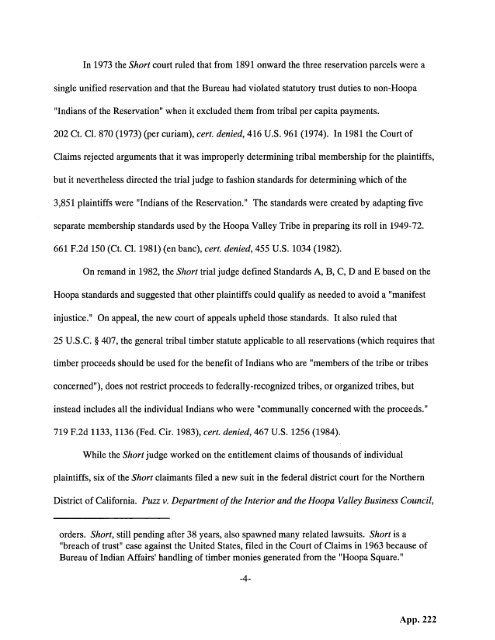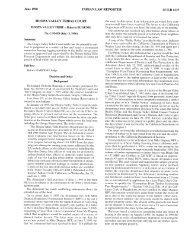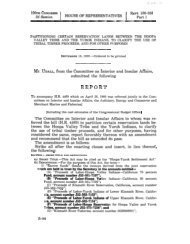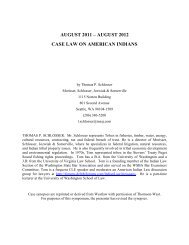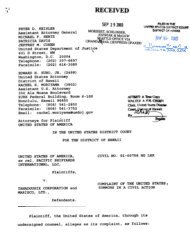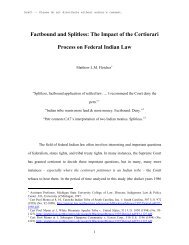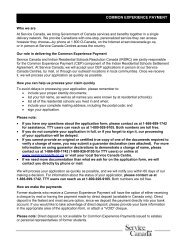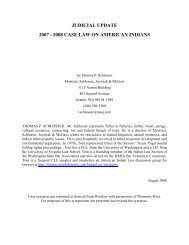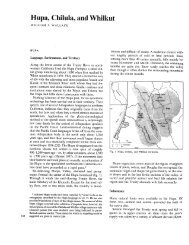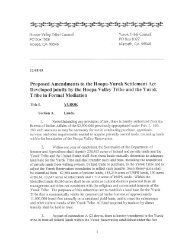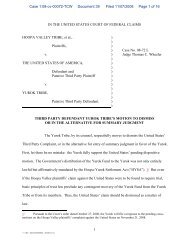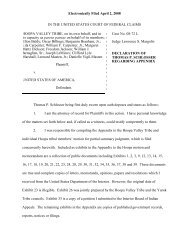Hoopa appendix supporting summary judgment - Schlosser Law Files
Hoopa appendix supporting summary judgment - Schlosser Law Files
Hoopa appendix supporting summary judgment - Schlosser Law Files
Create successful ePaper yourself
Turn your PDF publications into a flip-book with our unique Google optimized e-Paper software.
In 1973 the Short court ruled that from 1891 onward the three reservation parcels were a<br />
single unified reservation and that the Bureau had violated statutory trust duties to non-<strong>Hoopa</strong><br />
“Indians ofthe Reservation” when it excluded them from tribal per capita payments.<br />
202 Ct. Cl. 870 (1973) (per curiam), cert. denied, 416 U.S. 961 (1974). In 1981 the Court of<br />
Claims rejected arguments that it was improperly determining tribal membership for the plaintiffs,<br />
but it nevertheless directed the trial judge to fashion standards for determining which of the<br />
3,851 plaintiffs were “Indians of the Reservation.” The standards were created by adapting five<br />
separate membership standards used by the <strong>Hoopa</strong> Valley Tribe in preparing its roll in 1949-72.<br />
661 F.2d 150 (Ct. Cl. 1981) (en banc), cert. denied, 455 U.S. 1034 (1982).<br />
On remand in 1982, the Short trial judge defined Standards A, B, C, D and E based on the<br />
<strong>Hoopa</strong> standards and suggested that other plaintiffs could qualify as needed to avoid a “manifest<br />
injustice.” On appeal, the new court ofappeals upheld those standards. It also ruled that<br />
25 U.S.C. § 407, the general tribal timber statute applicable to all reservations (which requires that<br />
timber proceeds should be used for the benefit ofIndians who are “members ofthe tribe or tribes<br />
concerned”), does not restrict proceeds to federally-recognized tribes, or organized tribes, but<br />
instead includes all the individual Indians who were “communally concerned with the proceeds.”<br />
719 F.2d 1133, 1136 (Fed. Cir. 1983), cert. denied, 467 U.S. 1256 (1984).<br />
While the Short judge worked on the entitlement claims of thousands of individual<br />
plaintiffs, six of the Short claimants filed a new suit in the federal district court for the Northern<br />
District of California. Puzz v. Department ofthe Interior and the <strong>Hoopa</strong> Valley Business Council,<br />
orders. Short, still pending after 38 years, also spawned many related lawsuits. Short is a<br />
“breach of trust” case against the United States, filed in the Court of Claims in 1963 because of<br />
Bureau of Indian Affairs’ handling of timber monies generated from the “<strong>Hoopa</strong> Square.”<br />
-4-


